
Depression is a pervasive mental health disorder affecting millions worldwide. Despite its prevalence, identifying can be challenging due to its varied manifestations. Recognizing the signs early can lead to timely intervention and treatment. Let’s take a quick look into the key indicators of depression, drawing on scientific research and academic journals to provide a comprehensive overview.
Understanding Depression
Depression, also known as major depressive disorder (MDD), is characterized by persistent feelings of sadness, hopelessness, and a lack of interest or pleasure in activities once enjoyed. It affects mood, cognition, and physical health, significantly impairing daily functioning. Identifying depression involves recognizing a range of emotional, cognitive, and physical symptoms.
Key Signs
Persistent Sadness or Low Mood
A study published in The Lancet Psychiatry (2021) emphasizes that persistent sadness or a depressed mood is a core symptom of depression. According to the study, individuals often experience a continuous sense of gloom and hopelessness that lasts for most of the day, nearly every day.
Loss of Interest or Pleasure (Anhedonia)
Anhedonia, or the loss of interest in previously enjoyable activities, is a hallmark of depression. The Journal of Affective Disorders (2020) highlights that this symptom can be profound, affecting various areas of life, including social interactions, hobbies, and work. Individuals may find it difficult to derive pleasure from activities that once brought joy.
Significant Changes in Appetite or Weight
Changes in appetite and weight are significant indicators of depression. According to research published in JAMA Psychiatry (2019), individuals with depression may experience either increased or decreased appetite, leading to notable weight gain or loss. These changes can be linked to the disorder’s impact on metabolism and overall mood.
Sleep Disturbances
Sleep problems, including insomnia or excessive sleeping, are commonly associated with depression. The Sleep Medicine Reviews (2021) journal notes that disruptions in sleep patterns often exacerbate depressive symptoms, creating a vicious cycle of poor sleep and worsening mood.

Fatigue and Low Energy
Persistent fatigue and a lack of energy are common in depression. According to the American Journal of Psychiatry (2022), individuals with depression often report feeling physically drained and lacking motivation, even for routine tasks. This symptom can severely affect daily functioning and overall quality of life.
Difficulty Concentrating and Decision-Making
Cognitive difficulties, such as trouble concentrating and making decisions, are prevalent in depression. A study in Neuropsychology Review (2020) outlines how depression impairs cognitive processes, leading to indecisiveness and decreased productivity.
Feelings of Worthlessness or Excessive Guilt
Feelings of worthlessness and excessive guilt are key symptoms. Research published in Psychological Medicine (2021) highlights that individuals with depression often experience pervasive negative self-evaluation and guilt, which can worsen their overall sense of self-worth.
Thoughts of Death or Suicide
Thoughts of death or suicidal ideation are severe symptoms of depression. The British Journal of Psychiatry (2020) reports that these thoughts are critical indicators that require immediate attention. Individuals may express or act upon these thoughts, necessitating urgent intervention.
Recognizing the signs of depression is crucial for timely and effective treatment. Persistent sadness, loss of interest, appetite changes, sleep disturbances, fatigue, cognitive difficulties, feelings of worthlessness, and suicidal thoughts are key indicators. Scientific research supports the importance of these symptoms and underscores the need for professional evaluation. If you or someone you know exhibits these signs, seeking help from a mental health professional is essential for managing and overcoming depression. Early intervention can lead to better outcomes and improved quality of life.
Everyday is a New Day – Reap What You Sow
—
Struggling with Anxiety, Depression, or Weight Loss?
At Herstel Health, we consider the whole person. The mind and the body. Mental Health and Metabolic Health. Improving both together creates a harmonious state where you can thrive. The human being is an amazing organism with a tremendous capacity for self-healing whether regenerative growth from injury or fighting pathogenic invasion. Much of the illness and chronic disease we experience are rooted in metabolic disfunction and mental difficulties.
Schedule a FREE consultation today: www.HerstelHealth.com
